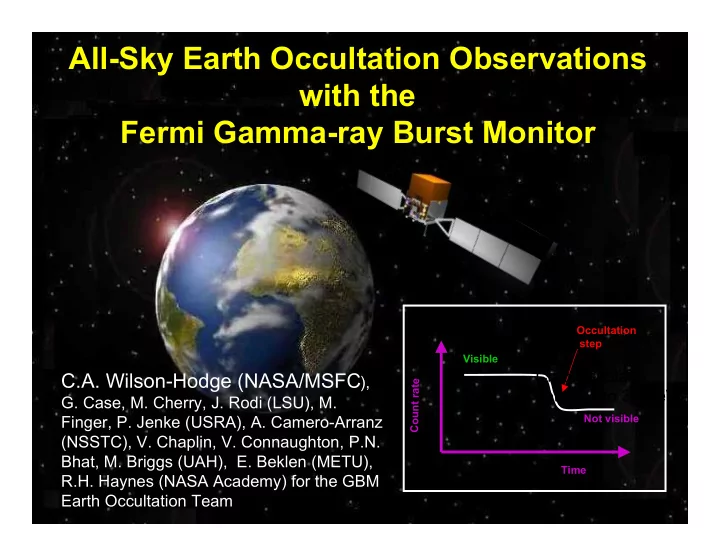

All-Sky Earth Occultation Observations with the Fermi Gamma-ray Burst Monitor Occultation step Visible Crab Nebula C.A. Wilson-Hodge (NASA/MSFC ), Count rate detected to 300keV G. Case, M. Cherry, J. Rodi (LSU), M. Not visible Finger, P. Jenke (USRA), A. Camero-Arranz (NSSTC), V. Chaplin, V. Connaughton, P.N. Bhat, M. Briggs (UAH), E. Beklen (METU), Time R.H. Haynes (NASA Academy) for the GBM Earth Occultation Team
Fermi Gamma Ray Burst Monitor (GBM) LAT • GBM • 12 NaI detectors • 8keV - 1 MeV • 2 BGO detectors GBM • 150 keV - 40 MeV Sodium Iodide (NaI) Detector GBM Bismuth Germanate (BGO) Detector
Earth Occultation Step Fitting • Predict occultation times • Determine detectors viewing source of interest • Fit to each detector and energy channel – Background model – Model count rates for each source • Detector responses • Assumed energy spectrum • Atmospheric • Fermi/CGRO differences transmission – Fermi rocks to +/-50 deg from • Compute best scale factor Zenith every orbit for all detectors to – Detector blockages estimate fluxes. – Low/High energy coverage
GBM Earth occultation monitoring • Initial catalog of 47 Crab Nebula sources detected to >300keV – X-ray binaries – Crab – Cen A • Developing software – Energy spectra Crab in BGO – Source monitoring using BGOs – Imaging (Poster Energy Spectra P5.209 Case et al.)
Black Hole Binaries with GBM and Swift/BAT Cyg X-1 Cyg X-3 GRS 1915+105
New BH More Black Hole Binaries Transient! Swift J1753.5-0127 XTE J1752-223 See Poster P5.195 Cherry et al. for more detections above 100 keV!
Accreting Pulsars with GBM Earth Occultation Vela X-1 A0535+26 Vela X-1 A0535+262 GX301-2
AGNs with GBM Earth Occultation
Summary • GBM Earth occultation technique is working nicely • Agreement with Swift/BAT is good • Source monitoring is underway for 47 sources • 7 sources detected in the 100-300 keV band (Poster P5.195 Cherry et al.) • Watch our website for new light curves • http://gammaray.nsstc.nasa.gov/gbm/science/occultation/
Recommend
More recommend